 Petzlover
PetzloverMiniature Schnauzer is originated from Germany but Southern Hound is originated from United Kingdom. Miniature Schnauzer may grow 35 cm / 13 inches shorter than Southern Hound. Miniature Schnauzer may weigh 31 kg / 68 pounds lesser than Southern Hound. Both Miniature Schnauzer and Southern Hound has almost same life span. Both Miniature Schnauzer and Southern Hound has almost same litter size. Miniature Schnauzer requires Moderate Maintenance. But Southern Hound requires Low Maintenance
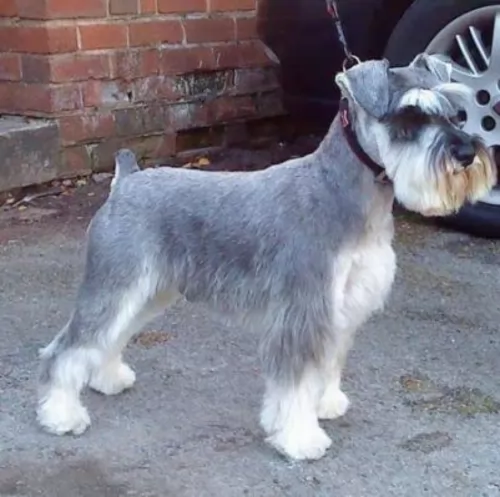 Miniature Schnauzers were first bred in Germany in the 19th century being bred from Affenpinschers and Standard Schnauzers.
Miniature Schnauzers were first bred in Germany in the 19th century being bred from Affenpinschers and Standard Schnauzers.
This dog was always used to control rats on farms, but these days he is more a companion. It is believed that the start of the modern Miniature Schnauzer in the United States was around 1924 when dogs were imported from Germany.
It was in 1933 that the Miniature Schnauzer was recognized by the AKC as a separate breed from the Standard Schnauzer.
The Southern Hound hails from England and is a breed of dog that existed sometime in the 19th century.
There isn’t much information available as to the time the dog became extinct. Some people believe that other breeds were bred with the dog until the true Southern Hound bloodline no longer existed. It was a breed of scent hound, and had an excellent sense of smell.
Known also as the Old English Hound, it was during the 18th century that the Southern Hound’s popularity waned and other kinds of hounds became more prominent.
While the Southern Hound has been extinct for decades, there is still some of this dog breed found in modern day breed.
It s believed that the Southern Hound has been used in the development of the Beagle and the Bloodhound as you can see the similarities.
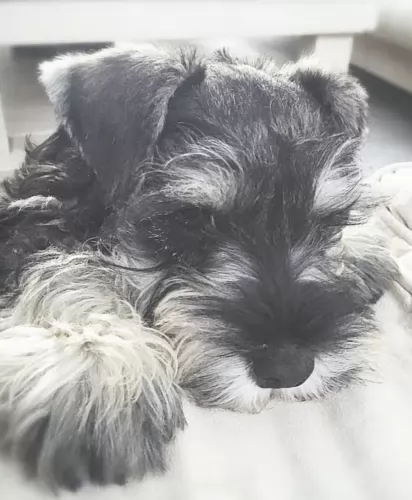 The Miniature Schnauzer is a small dog breed that stands between 30 to 36cm in height and weighs between 5 and 10kg.
The Miniature Schnauzer is a small dog breed that stands between 30 to 36cm in height and weighs between 5 and 10kg.
He has a sturdy body with a dense, wiry coat which most people prefer to have stripped. Because stripping is quite tedious, many of these dog owners prefer to have the coat clipped which actually gives the coat a greyish look to it.
The coat is usually a mix of black and silver. Some people refer to the Miniature Schnauzer as having a salt-and-pepper coat – hairs that are a mix of black and white. The dog has a double coat with the outer coat being wiry and the undercoat being a lot softer.
This is a dog that will need to be groomed frequently to prevent matting. A noticeable feature with these dogs is the rectangular shaped head with alert slanted eyes and bushy eyebrows, mustache and beard. In fact the word ‘Schnauzer’ means beard or muzzle.
The ears have been traditionally cropped but these days they are left and then they tend to be half-erect, half-floppy.
This is a tough little dog, fearless, cheeky, arrogant, alert and also friendly. A draw-card with him is that he is considered as a low-shedder and being hypoallergenic.
They’re very intelligent dogs too and will learn quickly when you give him training and socialization. This is important for a dog like this as he can quickly show you that he is strong willed and independent. Training and socialization makes him much nicer as he becomes more balanced and obedient.
He is full of life and extroverted and you can count on him to join you wherever you are and whatever you’re doing. Whether watching TV, swimming or hiking, he’ll be there and turn every occasion into a festive event. He is a loving, loyal dog, making a splendid pet.
He's protective of his human family and tends to be suspicious of strangers, and this is what makes him such a great watchdog.
The Southern Hound was a large, solidly built, deep chested dog with a square head and a longish muzzle. He stood at between 58-71 cm in height and weighed 25 – 41kg.
The Southern Hound had long, wide floppy ears, much like the Basset Hound of today. The tail was fairly long and curved upright. It was known for its deep melodious voice, much like the Bloodhound we have today.
It had excellent scenting abilities and was used to follow the trail of its prey. The coat of the Southern Hound was short and smooth and it is believed that the most common colors for the coat were white with black or brown markings, making it a tricolor dog.
Used to being on the hunt with other dogs, there is no doubt that the Southern Hound wasn’t aggressive towards other dogs and that he knew how to get along with them. It’s a dog that was dedicated to to the hunt and was bred to work, known for its stamina and endurance.
The dog didn’t possess strong herding or protective instincts and it is thought that it wasn’t kept as a companion dog. Because of the breeds used to develop this dog, it is assumed that it was a non-aggressive, friendly dog.
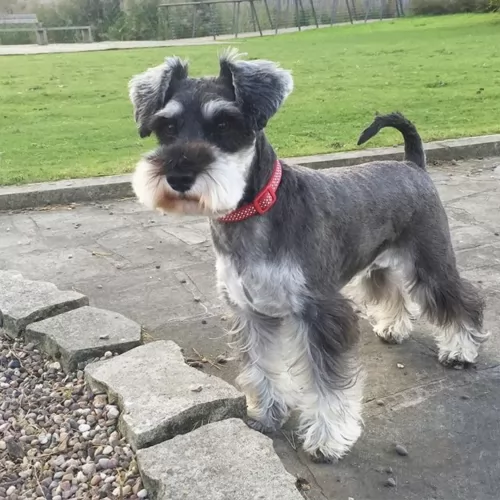 Miniature Schnauzers are such adaptable little dogs, quite happy to make a home with you in the city or in the countryside.
Miniature Schnauzers are such adaptable little dogs, quite happy to make a home with you in the city or in the countryside.
They’re sociable dogs, so just being with his human family wherever they are will suit him well. If he lives in the city however, he will need to have a walk everyday or taken to the park for a run.
He is also a dog that scarcely sheds, so he suits people battling with allergies. With an average life expectancy of 12 to 14 years, if you nurture your Mini Schnauzer and give him the best food and exercise there is, as well as loving him, you’re going to have a loyal and devoted pet.
The Southern Hound is no longer in existence, which is a pity as it seems as though he may have made an excellent pet in modern times.
They were a playful breed, loyal, gentle and affectionate and no doubt made a good watchdog too, although it is thought that his protective instincts weren’t good.
They aren’t dogs recommended for city living, but it seems according to the few records there are of this dog that he could have made a reliable, loving pet to have around.
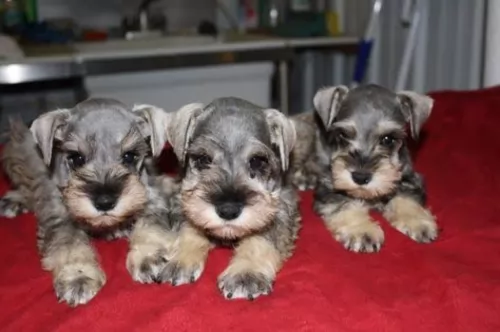 Your Miniature Schnauzer is pretty healthy and he isn’t likely to cost you much in terms of vet fees. There are however some common dog problems that you want to be aware of such as cataracts of the eye and hypothyroidism.
Your Miniature Schnauzer is pretty healthy and he isn’t likely to cost you much in terms of vet fees. There are however some common dog problems that you want to be aware of such as cataracts of the eye and hypothyroidism.
This a a problem in the lens of the eye. The lens should be clear, and when a dog has a cataract, it obscures the vision. The size of the cataract can lead to blindness.
Diabetes in a dog can bring on cataracts as can genetics or damage to the eye from exposure to ultraviolet light. Fortunately, dogs with cataracts can still see. Dogs with old cataracts can have surgery to remove them.
When a dog owner suspects a cataract in their pet’s eye it is best to treat it immediately with anti-inflammatory dog cataract eye drops. Cataracts never go away however without surgery.
The thyroid gland in the neck produces a hormone called thyroxine. It controls metabolism, but with hypothyroidism, enough of the hormone isn’t made. Its a common disease which affects all dog breeds.
Signs of hypothyroidism include hair loss, weight gain, intolerance to cold and a troublesome skin. To have the disease diagnosed, the vet will do a series of blood tests.
The Southern Hound had drop ears which would have made him prone to ear infections. This is because unlike dogs with erect ears, air isn’t able to circulate into the ear and the inside of the ear become a breeding place for bacteria.
The dog may have had to deal with Cherry Eye too. This eye problem affects the tear gland in the third eyelid. It needs to be treated so as to avoid long term eye problems. This is also because exposure of the tissue can bring on swelling, inflammation and infection.
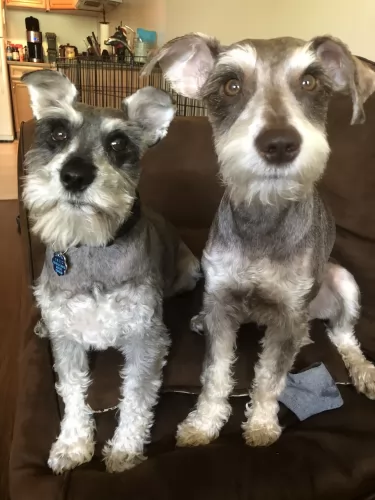 Let’s look at several ways you need to care for your Miniature Schnauzer -
Let’s look at several ways you need to care for your Miniature Schnauzer -
Make sure you have his puppy injections on time. This means knowing which veterinarian you’ll use. Later on if you don’t want to go in for breeding, you will need to have your pet spayed or neutered.
Make sure you have a nice warm, dry spot for your dog to sleep. It can be a cardboard box, or you can buy a dog basket or sleeping platform. Make sure your pet loves it and knows he can retreat to it anytime he wants.
If he goes outside for a few hours, make sure that he has a place to lie in the shade and away from the elements.
Good food promotes good health and longevity. You can feed your pet one of the top quality commercially manufactured foods and give your pet some variety by adding in some boiled chicken, vegetables and brown rice. Some raw meat occasionally can also be excellent for your pet.
Because this dog was once used as a hunting dog, they were accustomed to large open spaces. He would have required a fair amount of exercise. They would have needed a walk every day if he wasn't involved in a hunt that day.
The Southern Hound had a short coat and in those days he probably would have needed to be brushed once or twice a week.
The Southern Hound would have required top quality food to support his energy. If in that time there has been commercially manufactured food, it would have had to be the better quality ones. Today if you were feeding the Southern Hound you would check out the ingredients on the packaging and go for the dog foods with wholesome, natural ingredients in them.
No doubt the owners of these dogs provided their dogs with raw and cooked meat. If you had a Southern Hound today you would try to include some home-made food for him which would be simply mixed into the dry kibble twice a week. Boiled chicken, brown rice or pasta and spinach, sweet potatoes and carrots is super nutritious.
The Southern Hound would have required a constant supply of fresh, cool water within his reach.